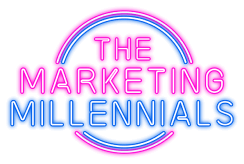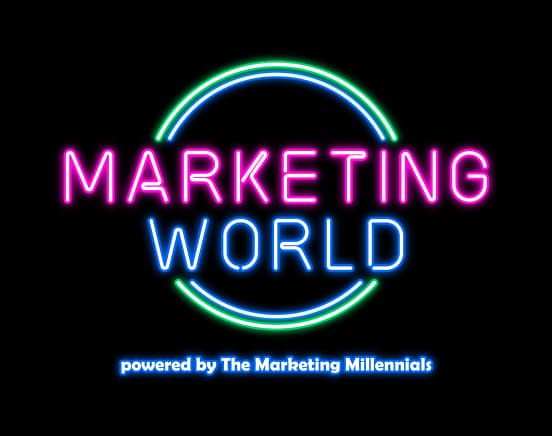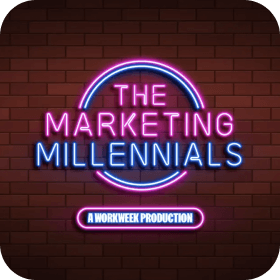I am absolutely stoked about today’s email. Why?
Because we have 2 LEGENDARY guests.
Meet Brooklin Nash and Sam Hembree, Co-Founders of Beam Content, a content agency unborifying B2B content.
(Yes, I did make up the word unborifying – just go with it LOL.)
These two have done it all, in-house, agency, freelancing, and they dropped ALL their knowledge on what you need to know about roles within each on The Marketing Millennials Podcast.
Here’s what they had to say, in their own liiiightly edited words.
1. Benefits of being an in-house Marketer:
“With in-house Marketing, you really learn how the business works and how the roles on a marketing team interact with other departments.
(I 100% agree, that was my biggest takeaway from working at SnackNation back in the day lol.)
Specifically with content, you get to see how your content supports other functions of the business. If you’re in a content agency, it would be more difficult to see the impact of your content on all functions of the business.
In-house Marketers also get to wear a lot of hats where you work on podcasts or newsletters and then a webinar program, observing what each of those things means and how they work.
It’s a great idea for a lot of freelancers to take some time in-house.
The knowledge you gain from learning the relationship between product marketers, demand gen, and field marketing is invaluable.
2. Pros of being a Freelance Marketer:
The big pro of freelancing is you get to focus on what’s really interesting and fun to you.
The most successful freelancers focus on a particular element of marketing, whether it be SEO, social, or messaging (NICHES GET RICHES).
The elephant in the room is that you can make a lot more money as a freelancer.
As you gain experience, you can increase your prices, and focus on the right types of clients (this is IT).
Level up your marketing game
Zero BS. Just fun, unfiltered, industry insights with the game-changers behind some of the coolest companies from around the globe.
No spam. Unsubscribe any time.
But it comes with challenges. It’s difficult to balance your priorities, deliver work on time, and create boundaries for yourself. A company shields you from some of those things.
With freelancing, your reputation is on the line. You’re running your own business, everything is on your shoulders, so there is a different layer of pressure.
3. If you’re thinking about freelancing, read this:
Freelancing is not the right path for everybody.
There are tons of people who have very successful full-time jobs and form a stellar career and get a lot of enjoyment out of it.
But people often underestimate certain aspects of freelancing.
Firstly, people underestimate how much they can make as a freelancer, especially if they have solid marketing experience.
Freelancing is more about leveraging your experience for your clients.
There is a flip side however, people underestimate how much time and energy goes into the non-creative work.
Like sending the scopes of work, having client relationship management tasks, setting up benefits and healthcare (the GRUNT work).
If you’re looking at freelancing, don’t jump in with both feet, dip your toe in the water. Find one client that you know you can work on interesting projects with and see how that goes.
If you like it, you get great feedback, and make a good chunk of money.
Then add another client to prove what the business model can look like for you.
Once you have that validation over 6 to 18 months and you’re still feeling solid about freelancing, then make that full-time jump.
4. Why work at an agency:
Agencies get a bad rap between long working hours, high pressure, and lower pay compared to in-house roles.
But there is one aspect of working at an agency that comes up time and time again that lures in talent, and that is the focus on creative work.
Agency work is incredibly project focused for clients. There is minimal red tape, bureaucracy, and project management that you deal with when you’re in an in-house role.
Some Marketers simply want to focus more on the creative work, rather than meetings and preparing for meetings and getting buy-in from senior leadership.
5. A hot Marketing take:
SEO is not content marketing. It’s a tactic for a specific channel for your content, but it is not the end all be all of content marketing (HOTTTT TAKE).
SEO makes sense for your site, but in a lot of cases it doesn’t make sense to prioritize SEO over other channels.
SEO is just a distribution channel, that’s all it is for content.
6. How to land the role you want:
A lot of people hold themselves back from applying for a role they think they’re not fit for.
Trust me, you can go for it. Apply. (You’ve got this bestie!!)
You just have to be creative, it’s hard to stand out, you can’t just send over your resume.
An example is noticing something on the landing page of the company you’re applying for that could be improved and offering insights into improving it for them.
You’re telling them, here’s what it would look like to work with me. You can prove your potential without having the experience and hiring managers will like that.
In addition to that, say “yes” a lot early on, so that you put yourself in a position to work on what’s interesting to you in the long term.
Don’t underestimate the value of your network and the value of putting time into building your network every week.
This doesn’t mean becoming a personal branding guru, but posting daily and engaging on LinkedIn.
Hop on calls, reach out to people internally at your company to learn from them, even if they’re not in your direct department (this is an incredibly underrated strategy).
Just spend time fostering relationships and you’ll learn a ton.
Opportunities will open up for you.”



